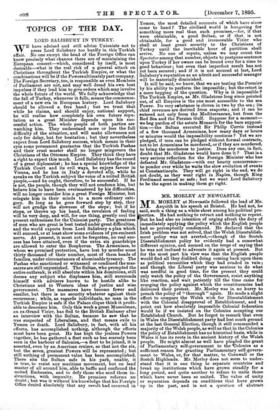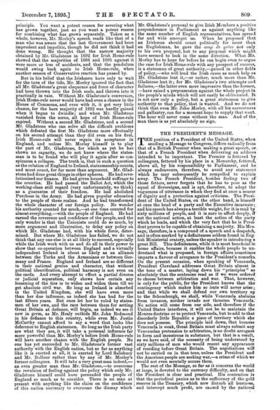MR. MORLEY AT NEWCASTLE.
MR. MORLEY at Newcastle followed the lead of Mr. Asquith in his speech at Bristol. He had not, he said, such a thing as a white sheet among his political pro- rties. He had nothing to retract and nothing to repent. But he had also no intention of urging afresh the duty of immediately applying the policy which the English people had so peremptorily condemned. He declared that the Irish problem was not solved, that the Welsh Disestablish- ment policy was not averted,—though of the Scotch Disestablishment policy he evidently had a somewhat different opinion, and seemed on the verge of saying that he was not inclined to advocate it again at present. But for the most part his view was that the English people would find all they disliked doing coming back upon them as political necessities which they had evaded in vain ; and though the Liberal party was anxious to do what was needful in good time, for the present they could only watch the policy of the Government, resist anything like reaction, and wait patiently till the time came for reurging the policy against which the constituencies had delivered their protest. Mr. Morley was in no hurry to preach the policy of " thorough " again. He made a slight effort to compare the Welsh wish for Disestablishment with the Colonial disapproval of Establishment, and to point out how absolutely impossible Colonial federation would be if we insisted on the Colonies accepting our Established Church. But he forgot to remark that even in Wales the Disestablishment party had lost much ground at the last General Election, though it still commanded a majority of the Welsh people, as well as that in the Colonies the policy of Establishment has no historical basis, while in Wales it has its roots in the ancient history of the Welsh people. He might almost as well have pleaded the grant of Parliamentary self-government to the lbolonies as a sufficient reason for granting Parliamentary self-govern- ment to Wales, or, for that matter, to Cornwall or the Scotch Highlands. Mr. Morley does not seem to under- stand that it is one thing to separate countries and break up institutions which have grown steadily for a long period, and quite another to refuse to unite those which have never been so united. The value of unity or separation depends on conditions that have grown up in the past., and is not a question of abstract principle. You want a potent reason for severing what has grown together, just as you want a potent reason for combining what has grown separately. Taken as a whole, however, Mr. Morley's speech reads like that of a man who was aware that the last Government had been imprudent and impolitic, though he did not think it had done wrong. He thought that the narrow majority obtained by Mr. Gladstone in 1892 for Irish Home-rule showed that the majorities of 1886 and 1895 against it were more or less of accidents, and that the pendulum would swing back again to Irish Home-rule, when another season of Conservative reaction has passed by.
But in his belief that the Irishmen have only to wait for the turn of the tide, Mr. Morley ignored the fact that all Mr. Gladstone's great eloquence and force of character had been thrown into the Irish scale, and thrown into it practically in vain. Without Mr. Gladstone's conversion, Irish Home-rule never would have had even a chance in the House of Commons, and even with it, it got very little chance, for the bare majority of 1892 was hardly gained when it began to dwindle; and when Mr. Gladstone vanished from the scene, all hope of Irish Home-rule expired. Without a second Mr. Gladstone, and a second Mr. Gladstone who can solve all the difficult problems which defeated the first Mr. Gladstone more effectually on his second attempt than they did even on his first, Irish Home-rule will never regain its acceptance in England, and unless Mr. Morley himself is to play the part of Mr. Gladstone, for which as yet be has shown no capacity, we do not know where the states- man is to be found who will play it again after so con- spicuous a collapse. The truth is, that in such a question as the relation of England to Ireland, statesmanship counts, and must count, for far more than argument. Mr. Glad- stone had done great things in other spheres. He had revo- lutionised our finance. He had given household suffrage to the counties. He had passed the Ballot Act, which the working-class still regard (very unfortunately, we think) as a guarantee of their freedom. He had abolished Purchase in the Army. He had given popular education to the people of these realms. And he had transformed the whole character of our foreign policy. No wonder his authority counted for much,—at one time counted for almost everything,—with the people of England. He had earned the reverence and confidence of the people, and the only wonder is that the Unionists could do BO much, by mere argument and illustration, to delay any policy on which Mr. Gladstone had, with his whole force, deter- mined. But where Mr. Gladstone has failed, we do not think that any one else is at all likely to succeed, especially while the Irish work with us and do all in their power to show that co-operation between England and a virtually independent Ireland is about as likely as an alliance between the Turks and the Armenians or between Ger- many and France. England and Ireland are so different in their national genius and character, that without political identification, political harmony is not even on the cards. And every attempt to effect a partial divorce or judicial separation, only shows how certain any loosening of the ties is to widen and widen them till we get absolute civil war. So long as Ireland is absorbed in the 'United Kingdom, she will have even more than her due influence, as indeed she has had for the last fifteen years. But once let her be ruled by states- men of her own, and the race between them for setting Great Britain at defiance, will begin, as indeed we see it now in germ, as Mr. Healy outbids Mr. John Redmond in his defiance to this country, while even Mr. Justin McCarthy cannot afford to say a word that looks like deference to English statesmen. So long as the Irish party are what they are, it will take a personal influence far more powerful than Mr. Morley's before Irish Home-rule will have another chance with the English people. No one has yet succeeded to Mr. Gladstone's former vast authority with the English nation, but so far as anything like it is exerted at all, it is exerted by Lord Salisbury and Mr. Balfour rather than by any of Mr. Morley's former colleagues. It will take a very great man indeed,-.--- an even greater man than Mr. Gladstone,—to overcome the revulsion of feeling against the policy which only Mr. Gladstone himself could have persuaded the people of England so much as to consider. There is no man at present with anything like the claim on the confidence of this nation necessary to overcome the dismay which Mr. Gladstone's proposal to give Irish Members a positive preponderance in Parliament as against anything like the same number of English representatives, has spread far and wide amongst tie. When he proposed that an Irishman should count politically for more than an Englishman, be gave the coup de grace not only to his own proposal, but to any proposal which might have seemed to look in the same direction. "What Mr. Morley has to hope for before he can begin even to argue the case for Irish Home-rule with any prospect of success, is a statesman of great authority,—gained in other fields of policy,—who will lend the Irish cause as much help as Mr. Gladstone lent it,—or rather, much more than Mr. Gladstone lent it ; for Mr. Gladstone's two attempts and failures,—the latter even more impressive than the former, —have raised a prepossession against the whole project in the people's minds which will not easily be obliterated. It is not now only a policy, but a great statesman to give authority to that policy, that is wanted. And we do not think that even Mr. John Morley, with all his earnestness and gallantry, can for a moment hope to supply that waut. The hour will never come without the man. And of the , man there is as yet absolutely no sign.























































 Previous page
Previous page